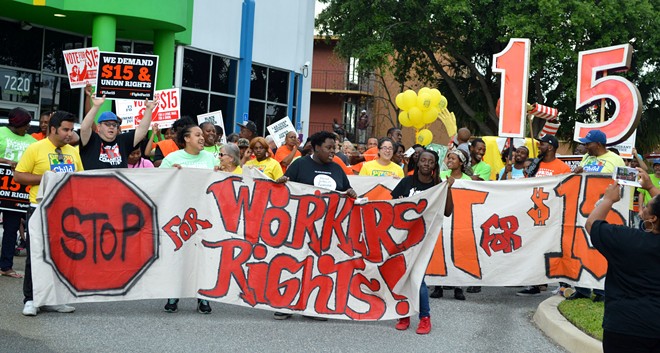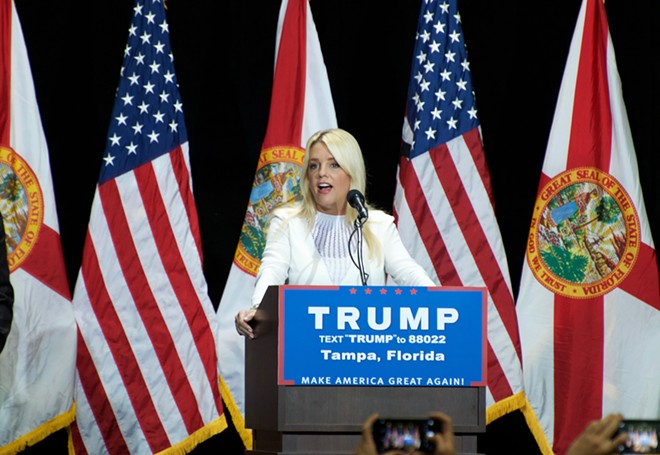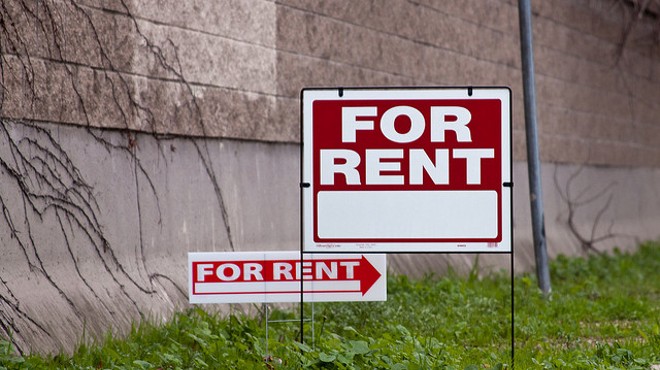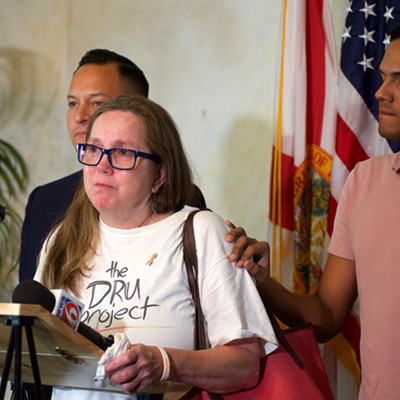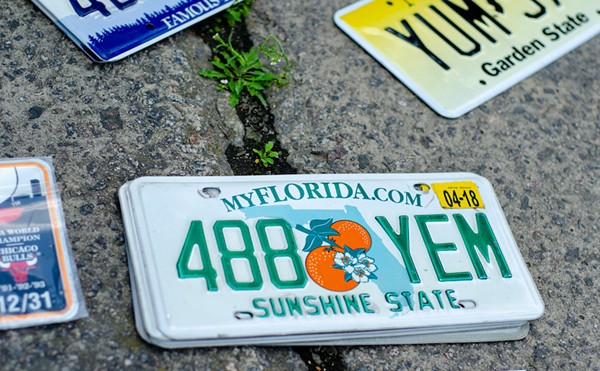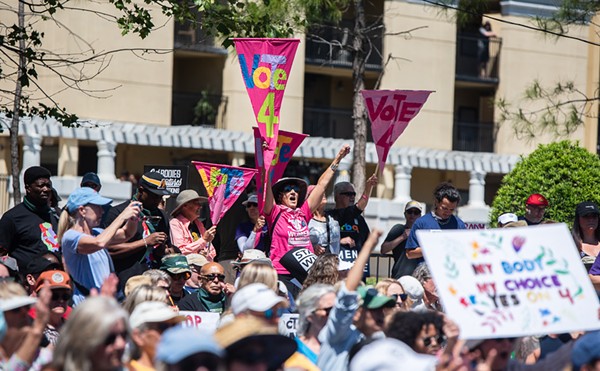Florida’s minimum wage increased by one dollar on Monday, making its wage floor now the highest in the U.S. Southeast. The state minimum wage is now $13 an hour for workers who don’t receive tips, and $8.98 an hour for tipped employees. This dollar increase came as a direct result of a ballot measure approved by a majority of Florida voters in 2020 to gradually increase the state minimum wage to $15 an hour.
As a result of this measure, Florida’s minimum wage rose to $10 an hour on Sept. 30, 2021, and has increased $1 on the same day each year after. The minimum wage will continue rising until it reaches $15 an hour on Sept. 30, 2026. After that, it will increase based on inflation.
Labor advocates, and even a coalition of business owners in support of a fair wage, celebrated this victory in 2020, made possible through a big-tent campaign that was largely bankrolled by prominent Orlando lawyer John Morgan. Still, both then and now, some policy experts question whether the state is up to the challenge of enforcing new wage requirements.
Although an employer who breaks the law in Florida could be sued privately, or face fines from the federal or state government, multiple media investigations have found that the state rarely takes action, and the U.S. Department of Labor's Wage and Hour Division (the federal enforcing agency) is dealing with a near-record low in staffing capacity to enforce laws concerning minimum wage, overtime and child labor.
Researchers have found that, even with protections in place, wage theft is a widespread issue in low-wage jobs like fast food work, and Florida in particular has been highlighted as a wage-theft hotspot. A 2017 report from the Economic Policy Institute found that Florida had the highest rate of minimum wage violations among the country’s 10 most populated states, beating out other populous states like New York, California and Texas.
Nationally, employers steal billions of dollars from workers’ paychecks annually, the report estimates. And in Florida, a state that lacks a labor department or dedicated staff to enforce wage laws, Floridians who are paid less than what they are owed have few, and imperfect, options to force their boss to pay up.
Workers who are paid less than minimum wage, for instance, can seek help through a private lawyer, or file a complaint with the federal Wage and Hour Division, which has several local offices located throughout Florida.
Still, the agency can only recover up to the federal minimum wage of $7.25 per hour, even though Florida’s state minimum wage is nearly double that.
In half a dozen counties — including Miami-Dade, Broward, Pinellas, Hillsborough, Alachua and Osceola — residents may also have access to a local wage recovery program they can contact for help, or a local program run by a community organization. But that still leaves out millions of Floridians outside those counties who don’t have access to such help in their communities.
This patchwork of relief leaves them instead to rely on the State Attorney General, who has for nearly two decades been the only state official whose office is authorized to enforce Florida’s minimum wage. The State Attorney General can also take civil action, as needed, to force a law-breaking employer to pay up.
As Orlando Weekly has previously reported, however, there is little to no evidence this actually happens, and certainly not to the scale that would be expected based on the size of Florida's workforce.
A 2018 Politico investigation, for instance, found that the state failed to take a single action to enforce Florida workers’ right to a minimum wage from 2011 to 2016, under former Attorney General Pam Bondi. Bondi, a MAGA supporter who later joined Donald Trump's legal team during his impeachment trial, made her stance on minimum wage requirements in office crystal clear.
As Florida Attorney General, Bondi's office sided with business groups over workers down in South Florida, who sought to combat wage theft in their local communities but faced pushback.Campaign finance records show that Bondi's successor, current State Attorney General Ashley Moody, has also received thousands of dollars in campaign contributions from some of the same business groups over the years that have historically fought efforts to raise Florida's minimum wage, including the Florida Chamber of Commerce and the Associated Industries of Florida.
A report from the Florida Policy Institute published in 2021 found that under Moody's leadership, her office similarly “took no formal enforcement actions and recovered no money” for those who filed wage complaints from 2016 to 2019.
And there's little evidence to suggest things have changed much since then. A spokesperson for the AG's office told Orlando Weekly last year that, from 2019 to 2023, Moody's office received 53 “contacts” regarding wage complaints, most of which were deemed “insufficient.”
“The majority of these complaints were determined to be insufficient for further action for reasons including, but not limited to, the contact was an inquiry rather than a complaint, the employee misunderstood the minimum wage requirements, the complaint involved unrelated contractual issues and the complaint failed to describe a violation of the minimum wage requirements,” director of communications Kylie Mason told Orlando Weekly over email. “Our office also contacted some of these complainants for more information and the complainants did not respond.”
None of the complaints received during that period led to civil enforcement action by the AG’s office — meaning, not a single employer was fined for breaking minimum wage requirements. Just six complaints received were “successfully resolved” by simply contacting the employer, according to Mason.
One such case, according to public records Orlando Weekly reviewed, involved Coby Reichard, a former pizza delivery driver for Hungry Howie’s in Hudson, Florida. who was paid less than minimum wage by his employer, Cheryl Smith.
Smith, a franchisee owner, allegedly fired Reichard the day he spoke up to question it, according to a complaint he submitted to the AG's office shortly after. Reichard reported last March that Smith had paid him and other delivery drivers just $7 an hour — about one dollar less than the state’s legal minimum wage at the time for tipped workers.
The AG's office investigated the driver's complaint, and ultimately helped him recover pay unlawfully stolen from his paycheck. About eight months after Reichard filed his original complaint, the former delivery driver received a check in the mail from his former boss for $544.29 after multiple email exchanges between the AG's office, Smith and her attorney.
The Hungry Howie's owner was also gently reminded by the state over email that, if she also underpaid other drivers, she should probably ensure she pays them their full wages, too. “I recommend that you make private efforts to remedy any other employees whose wages were similarly underpaid to avoid further complaints being levied against you,” assistant-AG Rebecca Snyder wrote in an email to Smith on Oct. 20, 2023.
Alexis Tsoukalas, a senior policy analyst for the Florida Policy Institute who has studied Florida’s minimum wage enforcement over the years, however, told Orlando Weekly she remains skeptical that the office has done much to help underpaid workers.
The AG's office has received just nine wage complaints this year, communications director Kylie Mason confirmed, down from just 12 last year.
Even the state of Connecticut, which has seen a concerning decline in enforcement activity amid their labor department's own struggles, recovered $2.4 million for underpaid workers last year, down from nearly $8 million just a few years before.
The Florida Policy Institute, a progressive social and economic policy think tank, estimated that, prior to the recent wage increase, Florida was home to roughly 830,500 low-wage workers who earned less than $13 an hour, many of whom are forced to spend the bulk of their income on basic living expenses such as food, childcare and housing.
A joint report from the FPI and Rutgers University's Center for Innovation in Worker Organization, released in 2021, shared that stronger enforcement of Florida's minimum wage is a critical need to address as the wage floor rises. After Florida's minimum wage rose from $5.15 to $6.15 an hour in 2005, their report notes that violations of minimum wage requirements nearly doubled, from a wage theft rate of about 7.6 percent among low-wage workers in Florida from 2000 to mid-2005, to nearly 14 percent by the fourth quarter of 2006.
This data, and results of wage recovery programs elsewhere, indicates that the few complaints filed with the AG's office are not evidence of wage theft not happening, but rather a “dramatic indication of the system’s failure,” researchers note.
Only five of the nine complaints the AG’s Office has received in 2024 remain under review, according to Mason, while the other four cases have been closed or dismissed. Mason did not specify why these cases were closed, when contacted for follow-up.
Most other states in the U.S. have their own state labor departments, or at the very least dedicated staff to investigate minimum wage violations. Florida, however, abolished its state department of labor in 2002 under then-Gov. Jeb Bush, and only gave the AG authority to enforce the minimum wage after Florida residents voted to establish a state minimum wage in 2004.
The federal Wage and Hour Division, when reached for comment, declined to provide Orlando Weekly a figure for the number of minimum wage complaints their division received last year from Florida, instead directing us to their database of confirmed violations.
According to public federal data, the division identified 440 cases of minimum wage violations in Florida last year, affecting workers in the restaurant and service industries, retail, landscaping, construction and more.
While the Biden administration has proposed budgets in recent years to beef up funding and staffing for federal labor agencies (to help aid in efficient enforcement, nationally), the outgoing president has faced roadblocks with Congress, particularly Republicans who favor spending cuts.
Former U.S. president Donald Trump, on the other hand, repealed an Obama-era regulation intended to curb wage violations, and did nothing to try and increase the federal minimum wage during his administration, which has sat at a measly $7.25 an hour since 2009.
The Florida legislature, meanwhile, has ignored multiple attempts to re-establish a state agency capable of going after wage theft, even as the Florida Chamber of Commerce trains a watchful eye on legislation that aims to do so.
Follow us: Apple News | Google News | NewsBreak | Reddit | Instagram | Facebook | Twitter | or sign up for our RSS Feed

